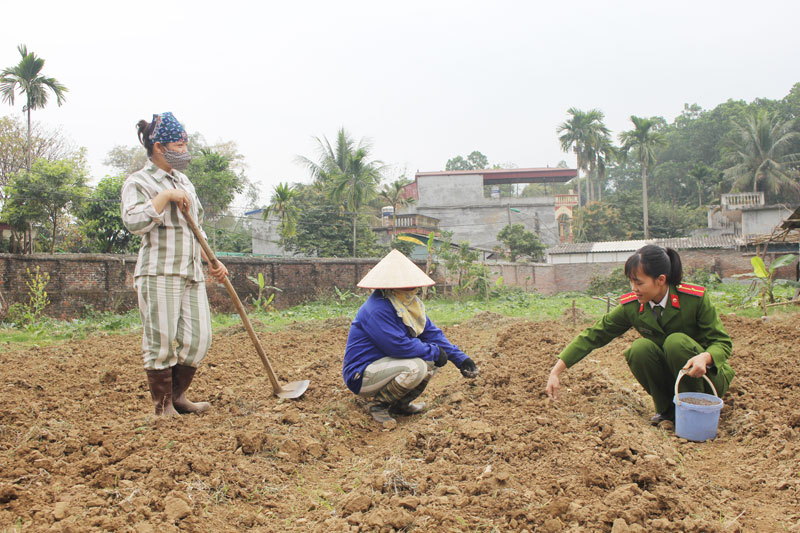
(HBO) – When visiting the detention centre of Hoa Binh’s police and talking to female prisoners there, we learnt of their affection and respect for the superintendents there. Among them, the person who was referred to the most was Second Lieutenant Ban Thi Hue. The young officer is enthusiastic about her work and excellently fulfils all duties assigned to her. She is acknowledged by her supervisors and colleagues.

Superintendent Ban Thi Hue directly guides and works
with prisoners.
A Dao ethnic from Thung Rech village in Tu
Son commune (Kim Boi district), Hue came from a family without anyone working
in the public security sector. But ever since in high school, Hue dreamt of becoming a female police officer.
Thanks to her efforts and diligence in studying, she was able to enter the school
of police to pursue her ambition.
After two years, Hue graduated with an excellent degree in
prison probation. She become a member of the Communist Party of Vietnam before
her graduation and received promotion one year ahead of schedule.
After graduation, in late 2015, she was sent
to the provincial police’s detention centre, where she showed no hesitation to
ask for assignment as a superintendent, a position involving difficult and
complicated work.
Aware of that fact, Hue constantly learnt from her senior
colleagues and applied what she studied in school. With kindness and altruism,
she regards the prisoners as her family members and is always ready to listen
and talk to them, thus understanding their feelings and wishes. Thanks to this,
she could find the best way to encourage the prisoners to correct their past
mistakes and show repentance in order to be able to return to their families
and society as soon as possible.
Hue often works together with the prisoners
to gain enhance experiences and get to know more about the women who committed
crime. She believed that if superintendents want to educate prisoners, they
have to become role models, who go everywhere, see and hear things with their
own eyes and ears, do what they promise and never stop thinking./.
With just over a month left until the school summer break, students are eagerly anticipating a period of rest and fun after a year of academic pressure. To provide a healthy environment for the physical development, in addition to the classes that foster talents and enhance the academic knowledge, sports and physical activities continue to attract a large number of children and teenagers.
On April 17th, Hoa Binh Provincial Museum organized a program to promote and introduce the outstanding values of "Hoa Binh Culture” at the Boarding Secondary and High School for ethnic minority students in Mai Chau District.
The Hoa Binh College of Technical Technology, in collaboration with the Hoa Binh Technical and Economic College and the provincial Association of Literature and Arts, hosted a gathering on April 15 to celebrate Laos’ traditional Bunpimay (New Year) Festival 2025 and debut the new book "Nguoi Muong o ban Don” (Muong people in Don village).
In the millennia-long history of national construction and safeguarding, people of all ethnic groups in Hoa Binh have been united and closely bound together to overcome all difficulties and challenges, standing alongside the entire Vietnamese people throughout the history of building and defending the country.
Living green is a healthy, positive, and sustainable lifestyle that not only helps protect
the environment and quality of life but also conserves natural resources and ecosystems.
Among the many ways to embrace this lifestyle, reducing plastic consumption is one of the most impactful.
The women's unions at all levels in Kim Boi district have been making significant contributions to the movement of building cultural life in the local community.
The movement helps improve rural look and the spiritual and material lives of local residents.



